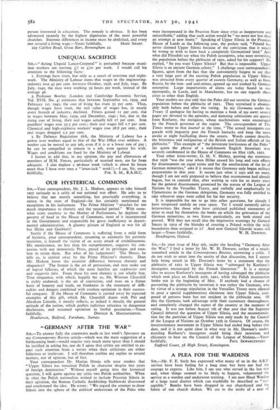UNEQUAL SACRIFICE
Sra,—" Acting Unpaid Lance-Corporal " is perturbed because muni- tion workers are earning £7 to Do per week. I would call his attention to the following facts :
1. Earnings have risen, but only as a result of overtime and night- work. The Ministry of Labour states that wages in the engineering- industry rose 43 per cent. between October, 1938, and July, 1940. By July, 1940, the men were working 59 hours per week, instead of the average 48.
2. Professor Rowley (London and Cambridge Economic Service, Vol. XVII, No. 4) estimates that between September 1st, 1939, and February 1st, 1940, the cost of living has risen 35 per cent. Thus, though wages have risen, the real value of wages has, in nearly every branch of industry, declined. Fitters gained 11 per cent. rise in wages between May, 1939, and December, 1940 ; but, due to the rising cost of living, their real wages actually fell 17 per cent. Iron puddlers' wages rose 32.3 per cent.; their real wages fell 1.7 per cent. Chemical and high-explosive workers' wages rose 28.8 per cent., their real wages dropped 5.2 per cent.
3. By Defence Regulation 58A, the Ministry of Labour has a power over workers equal to that of the War Office over soldiers. A worker can be moved to any job, even if it is at a lower rate of pay ; he can be compelled to remain in a job, even against his wish. Wages and conditions are fixed by the Ministry of Labour.
I hasten to add that, in my opinion, the pay and allowances of members of H.M. Forces, particularly of married men, are far from adequate. I also deplore a 96-hour week (which is about So hours more than I have ever seen a " lance-jack " work!).—I am, Sir, yours






























 Previous page
Previous page